I know that feeling all too well – you wake up already exhausted, your to-do list seems endless, and everyone needs something from you. Between work deadlines, family responsibilities, and trying to maintain some semblance of a social life, self-care often falls to the bottom of the priority list. But here’s the truth: you can’t pour from an empty cup.
If you’re a woman feeling tired and overwhelmed, this article is your permission slip to pause, breathe, and prioritize yourself. I’ve compiled practical, realistic self-care ideas that actually fit into your busy life – no expensive spa days or week-long retreats required (though those are nice too!). These are simple, effective strategies that can help you reclaim your energy, reduce stress, and feel more like yourself again.
Table of Contents
Key Takeaways
- Self-care isn’t selfish – it’s essential for your physical health, mental wellbeing, and ability to show up for others
- Small acts matter – even 5-10 minutes of intentional self-care can significantly reduce stress and boost your mood
- Customize your approach – the best self-care routine is one that fits YOUR lifestyle, preferences, and needs
- Physical and mental health are connected – caring for your body through rest, nutrition, and movement directly impacts your emotional resilience
- Consistency beats perfection – regular small acts of self-care are more effective than occasional grand gestures
—
Why Self-Care Ideas for Women Matter More Than Ever
Let’s be real: women today are juggling more than ever. We’re navigating careers, relationships, households, and often caring for children or aging parents simultaneously. According to recent research, women are significantly more likely than men to experience burnout, anxiety, and stress-related health issues.
Self-care isn’t about bubble baths and face masks (though those can be lovely). It’s about intentionally caring for your physical, emotional, and mental health so you can function at your best. When you’re running on empty, everything suffers – your work, your relationships, and most importantly, your health.
Think of self-care as preventive maintenance for your wellbeing. Just like you wouldn’t skip oil changes for your car and expect it to run smoothly, you can’t neglect your own needs and expect to thrive.
—
Physical Self-Care Ideas for Women
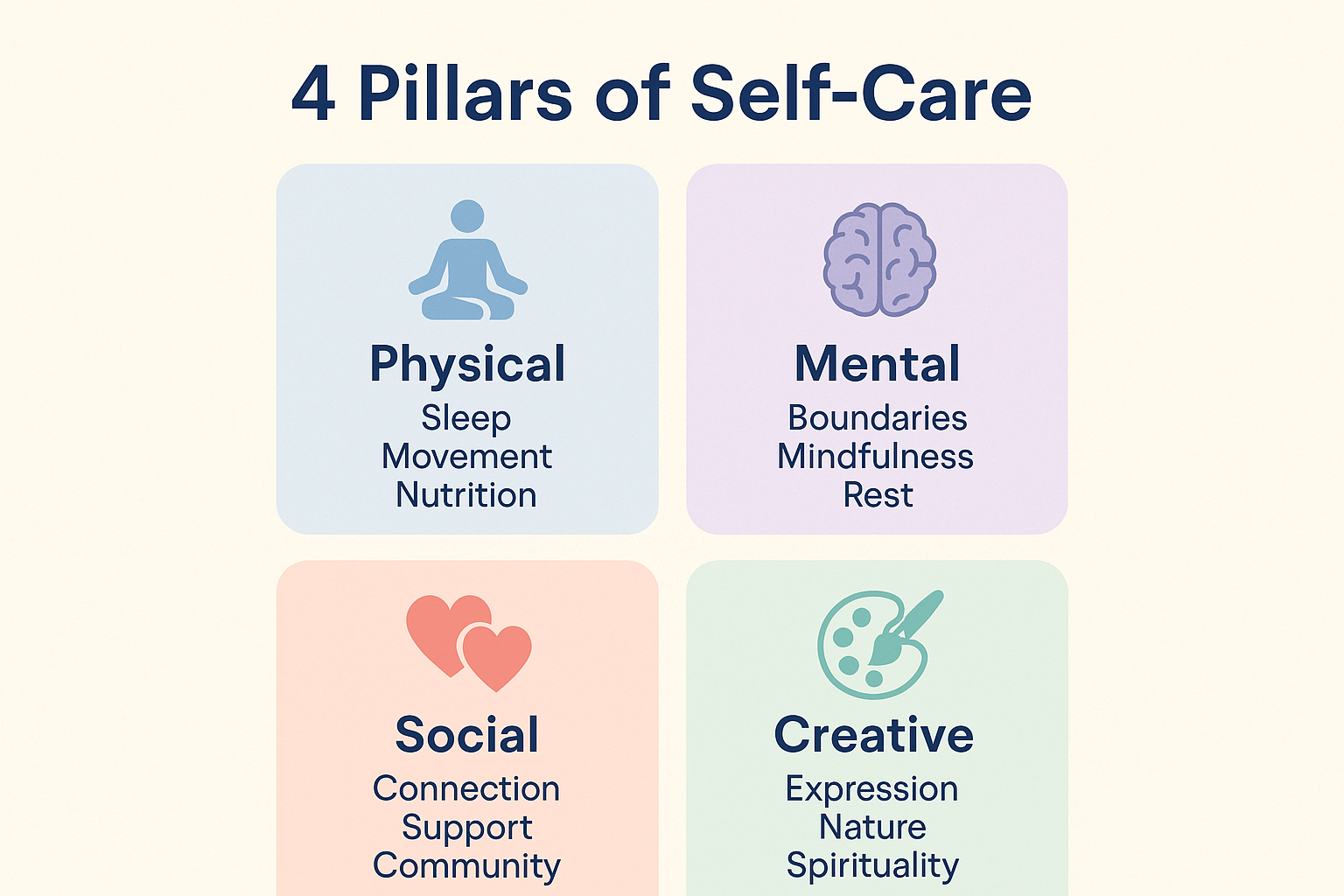
1. Prioritize Quality Sleep
Sleep isn’t a luxury – it’s a biological necessity. When you’re tired and overwhelmed, good sleep becomes even more critical.
Try these sleep-boosting strategies:
- Set a consistent bedtime and wake time (yes, even on weekends)
- Create a relaxing bedtime routine 30 minutes before sleep
- Keep your bedroom cool, dark, and quiet
- Limit screen time at least one hour before bed
- Try a calming tea like chamomile or lavender
I’ve found that treating my bedtime as sacred has been transformative. No more scrolling through social media at midnight!
2. Move Your Body in Ways You Enjoy
Exercise doesn’t have to mean grueling gym sessions. Find movement that brings you joy, not dread.
Movement ideas:
- Gentle yoga or stretching in the morning
- Dancing to your favorite music in your living room
- Walking in nature or around your neighborhood
- Swimming for low-impact full-body movement
- Pilates or barre classes
- Gardening or active hobbies
The key is consistency over intensity. Even a 10-minute walk can improve your mood and energy levels.
3. Nourish Your Body Properly
When we’re overwhelmed, nutrition often takes a backseat. We grab whatever’s convenient, skip meals, or rely on caffeine and sugar for energy.
Simple nutrition self-care:
- Meal prep on Sundays for easier weekday eating
- Keep healthy snacks readily available (nuts, fruit, yogurt)
- Stay hydrated – aim for 8 glasses of water daily
- Don’t skip breakfast – it sets the tone for your day
- Limit caffeine after 2 PM for better sleep
During your menstrual cycle, your nutritional needs change. Check out these period day routine meals and self-care tips for cycle-specific nutrition guidance.
4. Honor Your Menstrual Cycle Needs
Your period isn’t just a monthly inconvenience – it’s an opportunity for extra self-care. Many women feel more tired during menstruation, and that’s completely normal.
Period-specific self-care:
- Adjust your exercise intensity during your period
- Use heat therapy for cramps and discomfort
- Rest more if your body needs it
- Track your cycle to anticipate energy fluctuations
I’ve learned so much about working with my cycle rather than against it. These healthy period habits have been game-changers for managing energy throughout the month.
—
Mental and Emotional Self-Care Ideas for Women
5. Establish Firm Boundaries
One of the biggest reasons women feel overwhelmed is the inability to say no. Boundaries aren’t walls – they’re guidelines for how you want to be treated and what you can realistically handle.
Boundary-setting tips:
- Practice saying “no” without over-explaining
- Communicate your limits clearly and kindly
- Don’t respond to work emails after hours
- Protect your personal time as fiercely as work commitments
- Remember: saying no to others means saying yes to yourself
This was the hardest lesson for me to learn, but also the most liberating.
6. Create a Journaling Practice
Journaling is one of the most powerful (and free!) self-care tools available. It helps you process emotions, gain clarity, and reduce anxiety.
Journaling ideas:
- Morning pages – stream-of-consciousness writing first thing
- Gratitude journaling – list 3-5 things you’re thankful for daily
- Brain dumps – write everything on your mind to clear mental clutter
- Reflection prompts – explore your feelings and experiences
- Seasonal journaling – like these October journal ideas for autumn
If you’re looking to cultivate more positivity, try these gratitude list tips for a happier life.
7. Practice Mindfulness and Meditation
You don’t need to be a zen master to benefit from mindfulness. Even brief moments of presence can significantly reduce stress.
Simple mindfulness practices:
- 5-minute breathing exercises when you wake up
- Body scan meditation before bed
- Mindful eating – actually taste and enjoy your food
- Walking meditation – focus on each step and breath
- Apps like Calm, Headspace, or Insight Timer for guidance
Start with just 5 minutes daily. The consistency matters more than the duration.
8. Limit Social Media and News Consumption
Constant connectivity is exhausting. The comparison trap on social media and the anxiety-inducing news cycle can drain your mental energy.
Digital wellness strategies:
- Set specific times for checking social media
- Turn off non-essential notifications
- Use app timers to limit daily usage
- Create phone-free zones (bedroom, dinner table)
- Unfollow accounts that make you feel bad about yourself
I’ve found that my Sunday mornings are so much more peaceful since I stopped scrolling Instagram in bed.
—
Social and Relational Self-Care Ideas for Women
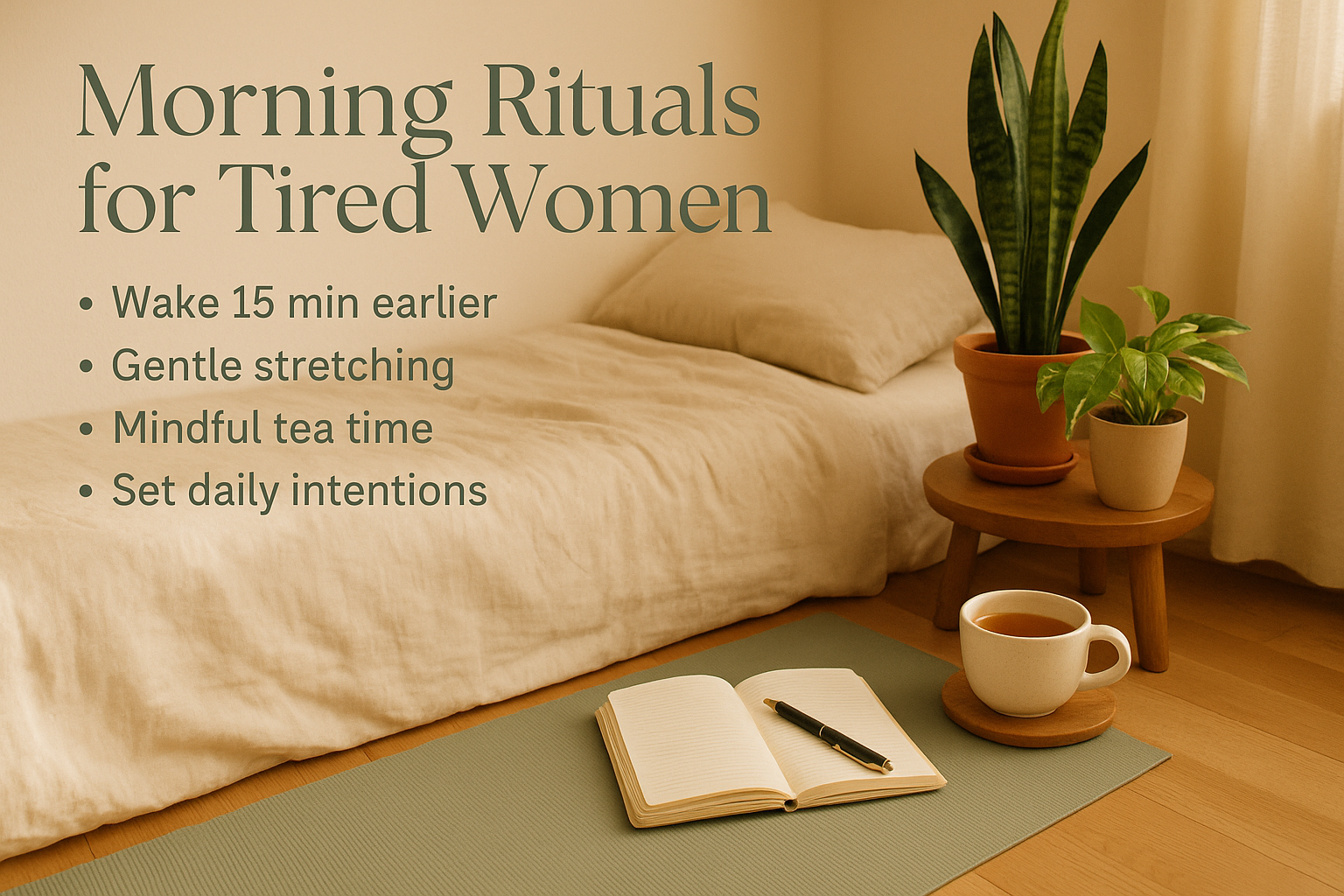
9. Nurture Meaningful Connections
Quality relationships are essential for wellbeing. When you’re overwhelmed, it’s tempting to isolate, but connection is actually what you need most.
Relationship self-care:
- Schedule regular coffee dates or video calls with close friends
- Join a book club, fitness class, or hobby group
- Be honest about your struggles – vulnerability deepens connection
- Limit time with energy-draining people
- Invest in relationships that are reciprocal and supportive
10. Ask for and Accept Help
This is a tough one for many women. We’re conditioned to be caregivers, not care-receivers. But asking for help isn’t weakness – it’s wisdom.
Ways to get support:
- Delegate household tasks to family members
- Hire help if financially possible (cleaning service, meal delivery)
- Join support groups for shared challenges
- See a therapist or counselor
- Let friends know specific ways they can help
Remember: people who love you WANT to support you.
—
Creative and Spiritual Self-Care Ideas for Women
11. Engage in Creative Expression
Creativity isn’t just for artists – it’s a fundamental human need. Creative activities activate different parts of your brain and provide a healthy escape from stress.
Creative outlets:
- Doodling or sketching – try these October doodles for inspiration
- Coloring books for adults
- Crafting (knitting, pottery, scrapbooking)
- Cooking or baking new recipes
- Writing poetry, stories, or songs
- Photography walks in your neighborhood
You don’t have to be “good” at it – the process is what matters.
12. Connect with Nature
Nature has scientifically proven stress-reducing effects. Even brief exposure to natural environments can lower cortisol levels and improve mood.
Nature-based self-care:
- Take forest baths (slow, mindful walks in wooded areas)
- Sit outside during your lunch break
- Bring plants into your home or workspace
- Garden or care for houseplants
- Watch the sunrise or sunset
- Listen to nature sounds if you can’t get outside
I try to spend at least 15 minutes outside daily, even if it’s just sitting on my porch with morning coffee.
13. Explore Your Spirituality
Spiritual practices (religious or secular) provide meaning, comfort, and perspective during difficult times.
Spiritual self-care:
- Prayer or meditation
- Reading inspirational texts
- Attending religious services or spiritual gatherings
- Practicing yoga as a spiritual discipline
- Spending time in sacred spaces
- Exploring philosophical questions about purpose and meaning
—
Practical Self-Care Ideas for Women with Limited Time
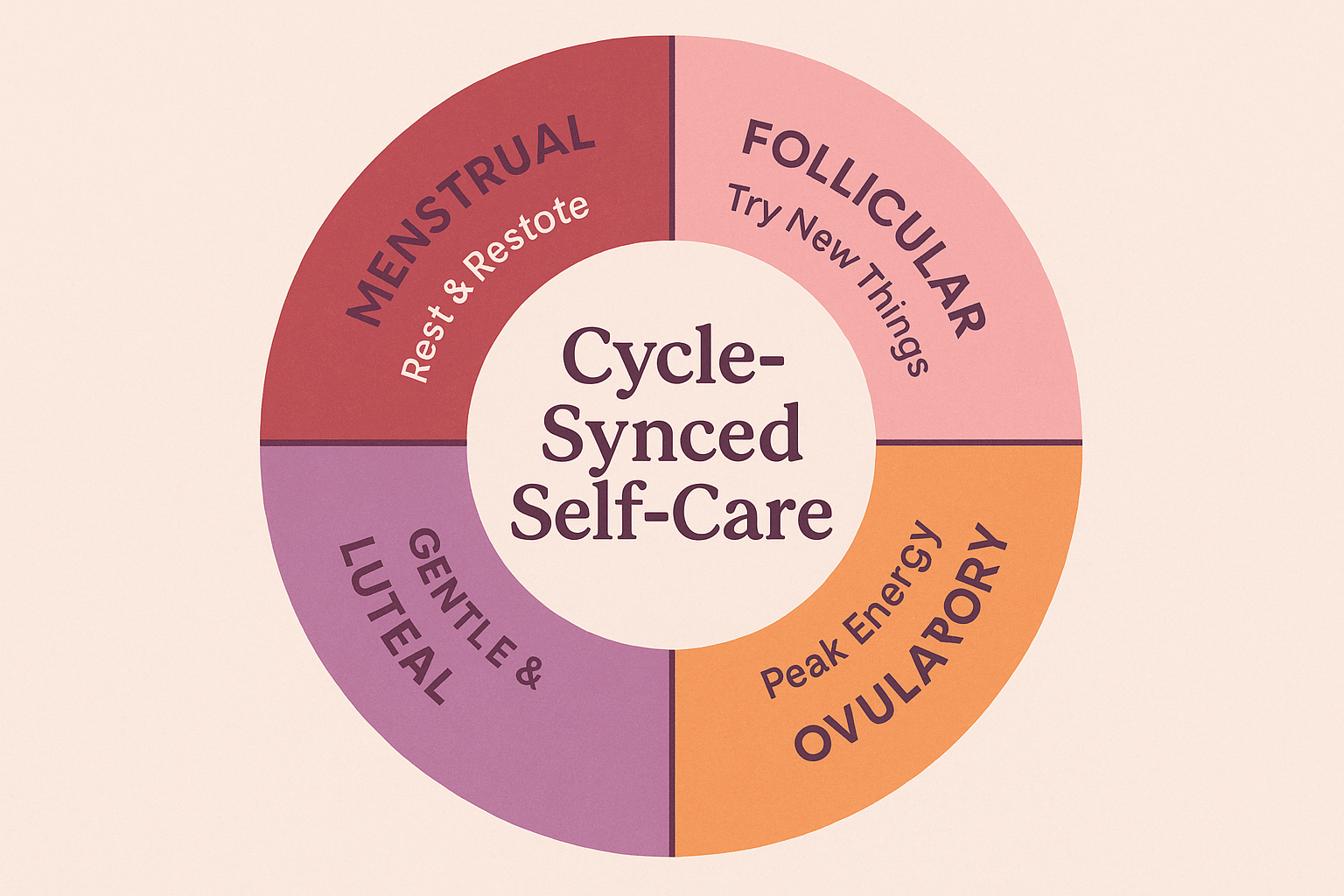
14. Master the Art of Micro Self-Care
Don’t have hours for self-care? No problem. Micro self-care involves tiny acts of kindness toward yourself throughout the day.
5-minute self-care acts:
- Stretch at your desk
- Drink a cup of tea mindfully
- Step outside for fresh air
- Listen to one favorite song
- Do a quick face massage
- Practice deep breathing
- Text a friend you’re thinking of them
10-minute self-care acts:
- Take a power nap
- Do a quick yoga flow
- Paint your nails
- Read a chapter of a book
- Take a relaxing shower
- Make a nourishing smoothie
These small moments add up to significant wellbeing benefits.
15. Create Morning and Evening Rituals
Bookending your day with intentional rituals creates structure and ensures daily self-care.
Morning ritual ideas:
- Wake up 15 minutes earlier for quiet time
- Drink lemon water before coffee
- Do gentle stretches or yoga
- Set intentions for the day
- Avoid checking your phone immediately
For period days specifically, check out the best morning routine for period days to start your day right even when you’re not feeling your best.
Evening ritual ideas:
- Skincare routine as meditation
- Gratitude journaling
- Prepare tomorrow’s outfit and lunch
- Read fiction (not work-related material)
- Gentle stretching or restorative yoga
—
Self-Care Ideas for Women During Challenging Times
16. Build a Self-Care Emergency Kit
For those extra tough days when you’re on the verge of burnout, having a pre-planned “emergency kit” can be a lifesaver.
What to include:
- List of comforting activities that always help
- Emergency contacts (therapist, supportive friends)
- Favorite comfort items (cozy blanket, essential oils, chocolate)
- Playlists for different moods
- Inspiring quotes or affirmations
- Breathing exercise instructions
17. Practice Self-Compassion
We’re often our own harshest critics. Self-compassion means treating yourself with the same kindness you’d offer a good friend.
Self-compassion practices:
- Notice your negative self-talk and reframe it
- Acknowledge that struggle is part of being human
- Give yourself permission to be imperfect
- Celebrate small wins and progress
- Use gentle, encouraging language with yourself
“You yourself, as much as anybody in the entire universe, deserve your love and affection.” – Buddha
—
Creating Your Personalized Self-Care Plan
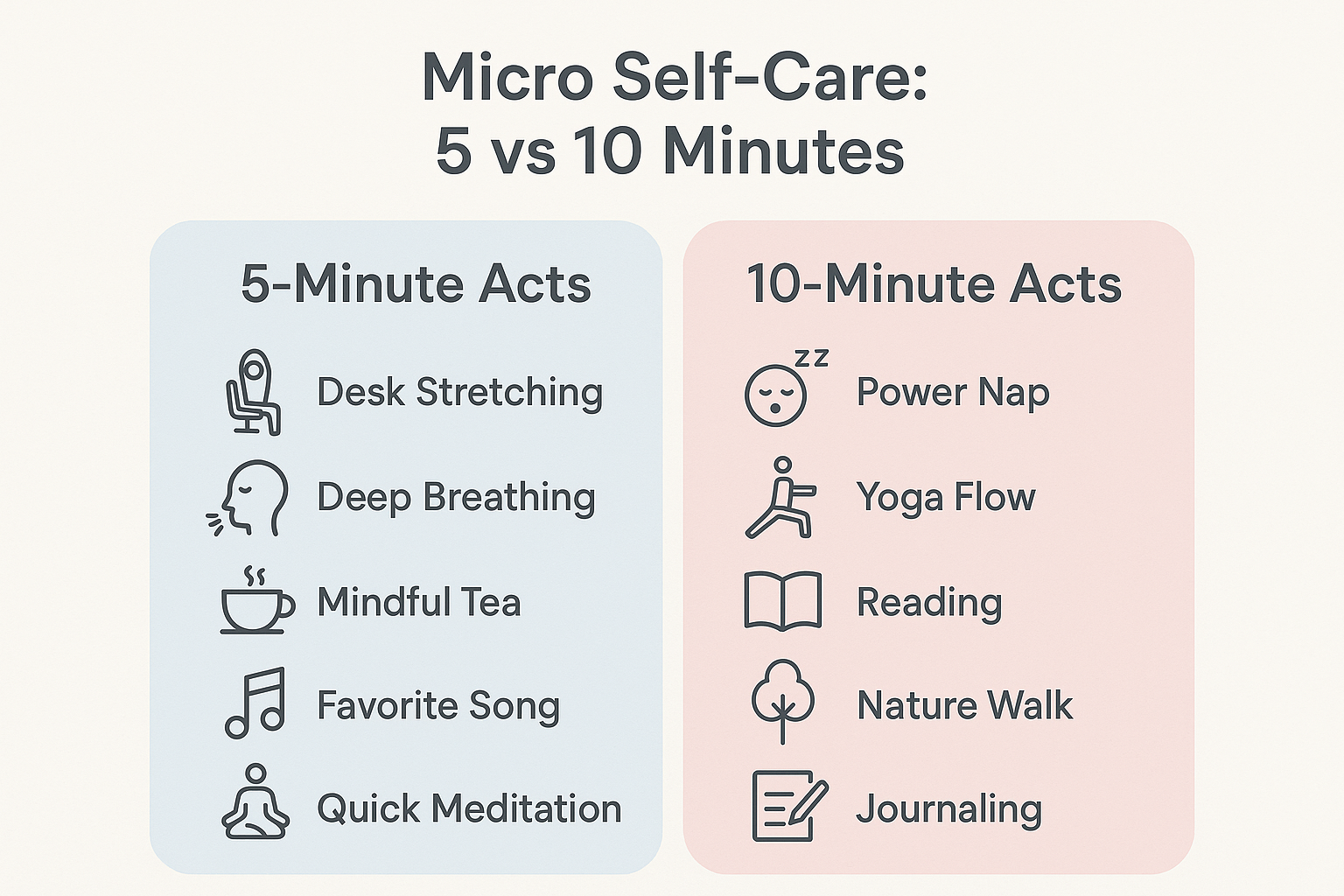
18. Assess Your Current Self-Care 📊
Before adding new practices, evaluate what you’re already doing (or not doing).
| Self-Care Category | Current Practices | What’s Missing? | What to Add |
|——————-|——————-|—————–|————-|
| Physical | | | |
| Mental/Emotional | | | |
| Social | | | |
| Creative/Spiritual | | | |
| Practical | | | |
19. Start Small and Build Gradually
The biggest mistake is trying to overhaul your entire life overnight. Start with one or two practices and build from there.
Implementation strategy:
- Choose 1-2 self-care ideas from this list that resonate most
- Schedule them in your calendar like important appointments
- Practice for 2-3 weeks until they become habit
- Add another practice once the first ones feel natural
- Regularly reassess and adjust as needed
20. Track and Celebrate Your Progress
Keep a simple log of your self-care practices and how they make you feel. This helps you identify what works best for YOU.
Tracking methods:
- Bullet journal habit tracker
- Notes app on your phone
- Dedicated self-care journal
- Calendar with color-coded activities
Celebrate your consistency! Every act of self-care is worth acknowledging.
—
Common Self-Care Barriers and How to Overcome Them
“I Don’t Have Time”
This is the most common excuse, and I get it – you’re busy! But self-care doesn’t require hours. Start with 5-10 minutes daily. You have time; it’s about making it a priority.
Solution: Wake up 15 minutes earlier, or use your lunch break differently.
“I Feel Guilty Taking Time for Myself”
Many women struggle with guilt around self-care, especially mothers and caregivers. But remember: taking care of yourself makes you better able to care for others.
Solution: Reframe self-care as responsibility, not indulgence.
“Self-Care Feels Selfish”
Self-care isn’t selfish – it’s self-preservation. You can’t give what you don’t have.
Solution: Notice how your improved wellbeing positively impacts those around you.
“I Don’t Know Where to Start”
The options can feel overwhelming. Start simple.
Solution: Choose ONE practice from this article and commit to it for one week.
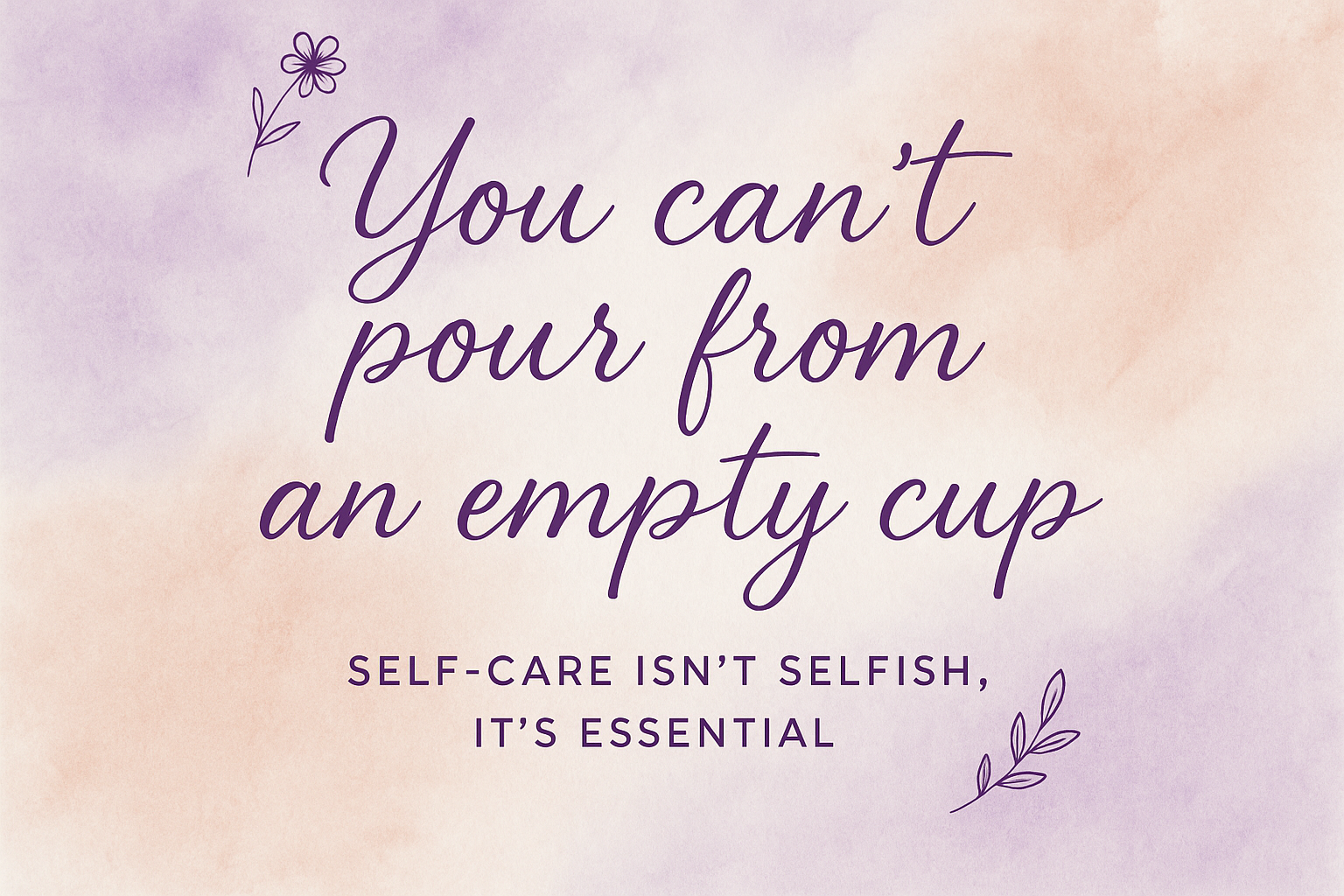
Building a Sustainable Self-Care Lifestyle
Self-care isn’t a one-time fix or a trend – it’s a lifelong practice that evolves with you.
Long-term self-care success:
Make it non-negotiable – treat self-care appointments like doctor’s appointments
Find accountability – share your goals with a friend or join a community
Be flexible – what works in one season of life may need adjustment later
Avoid perfectionism – missing a day doesn’t mean failure
Regularly reassess – check in monthly about what’s working and what isn’t
Invest in yourself – whether time, money, or energy, you’re worth it
—
Conclusion: Your Journey to Feeling Less Overwhelmed Starts Now
If you’re feeling tired and overwhelmed, you’re not alone, and you’re not broken. You’re simply human, navigating a complex world with limited resources. The self-care ideas for women I’ve shared aren’t about adding more to your already full plate – they’re about nourishing yourself so you can show up as your best self.
You deserve to feel energized, peaceful, and joyful. Self-care isn’t a luxury reserved for when you have extra time or money – it’s your birthright. Start small, be consistent, and watch how these practices transform your life.
What self-care idea will you try first? Remember, the journey of a thousand miles begins with a single step. Your step starts today.
—




